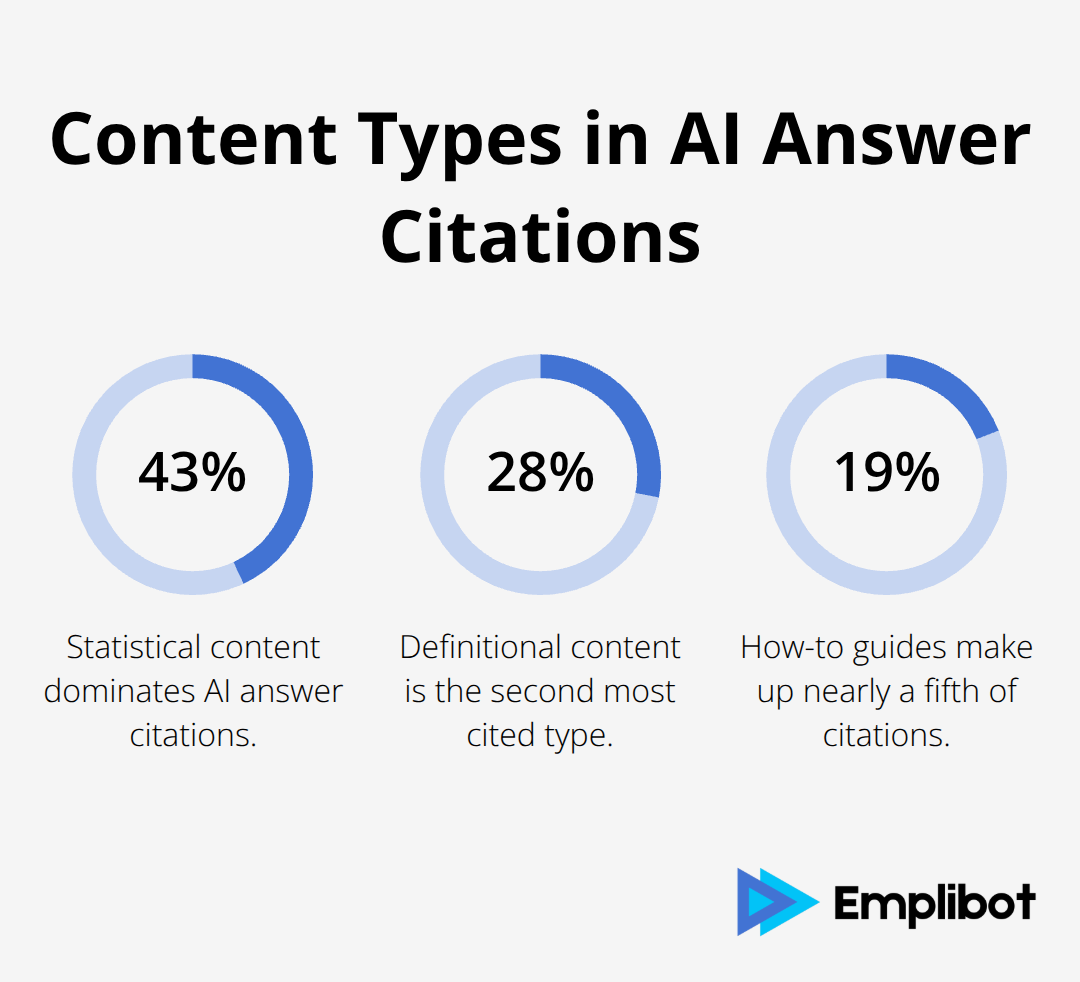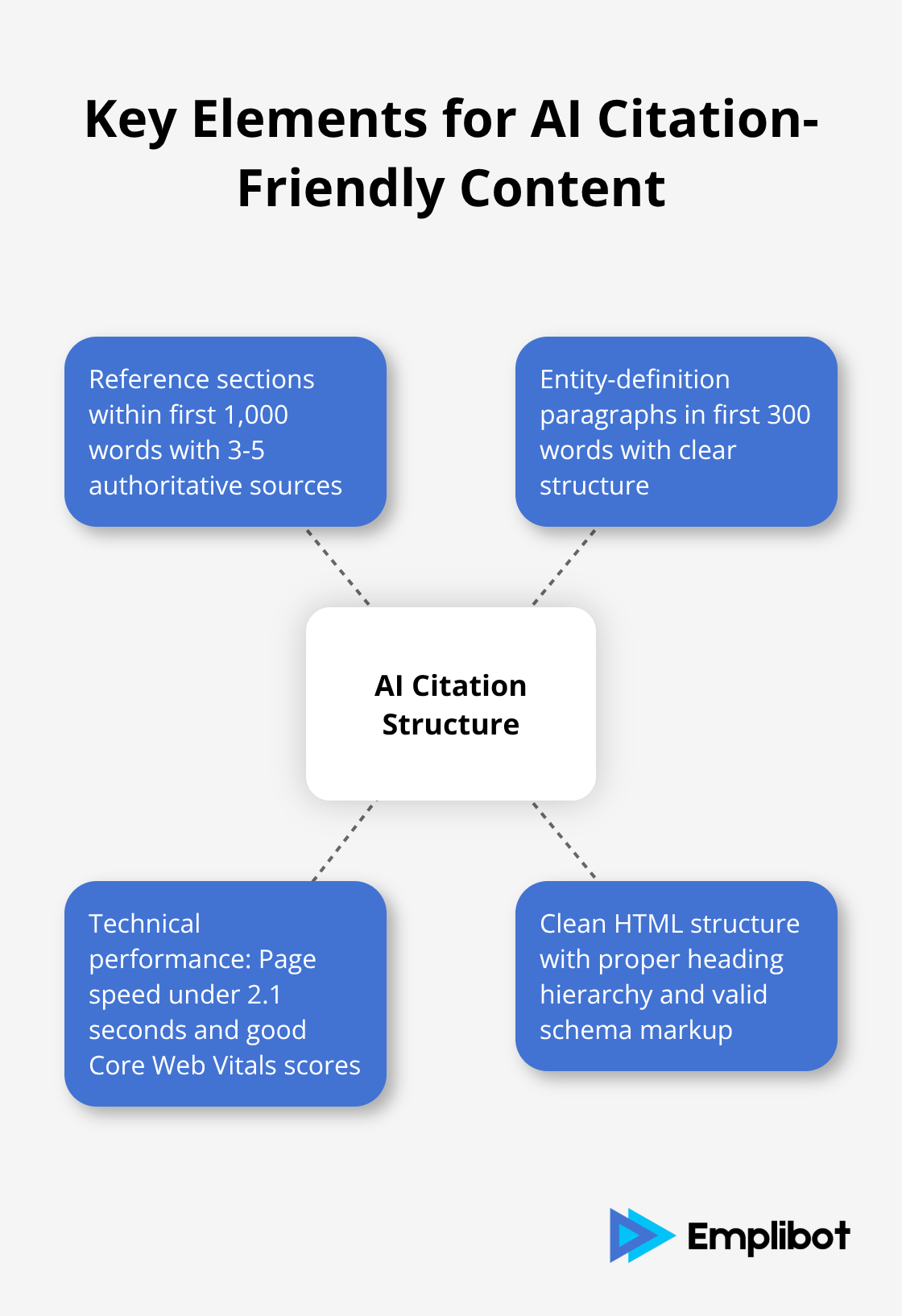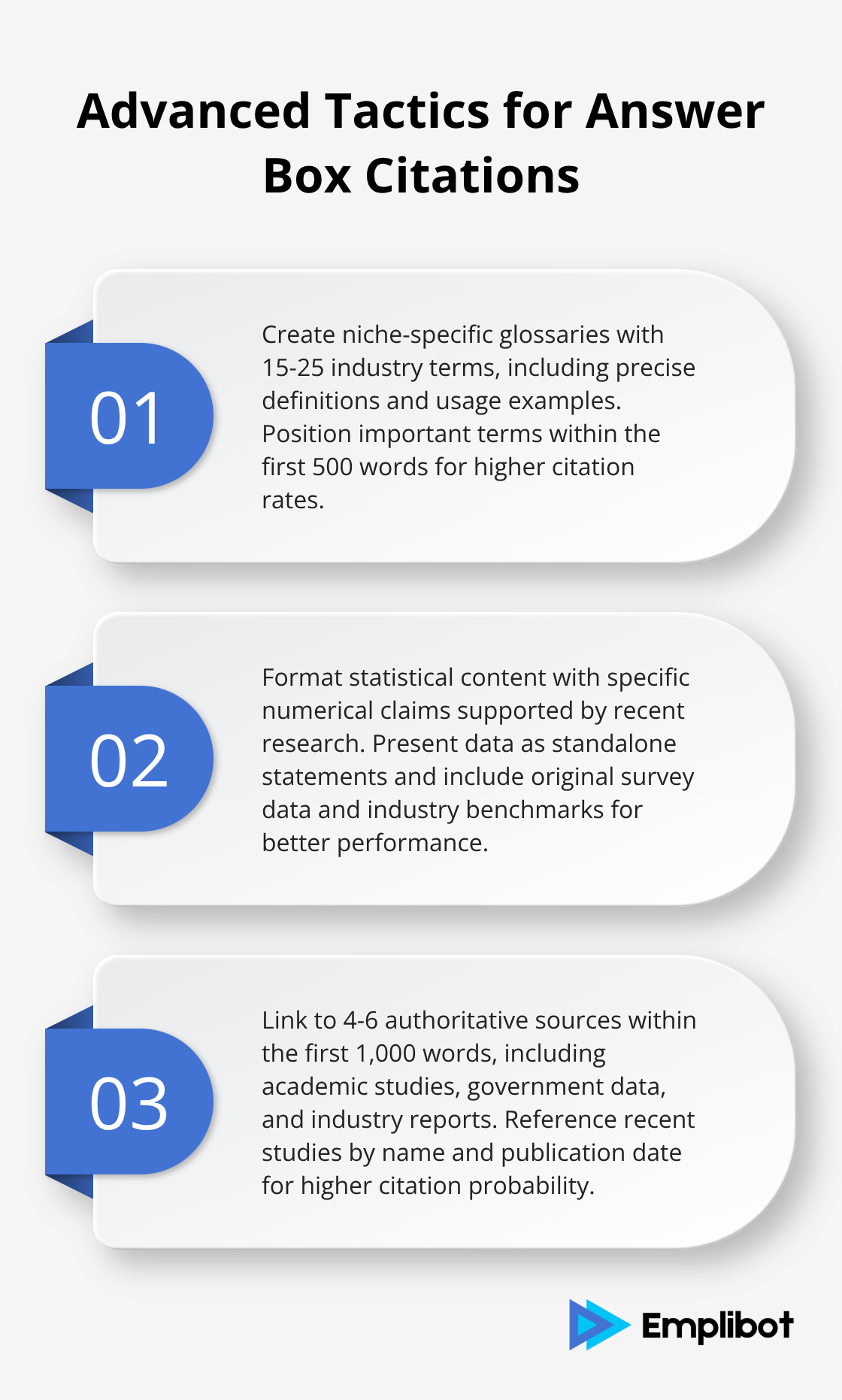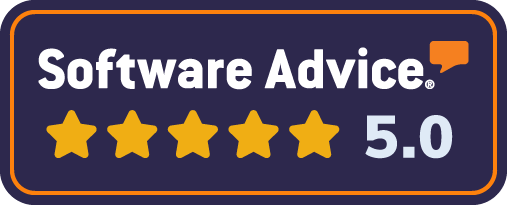AI search engines like Brave and DuckDuckGo now generate instant answers that can showcase your brand to millions of users. Getting featured in these Brave and DuckDuckGo answers citations drives targeted traffic and builds authority.
Most brands miss these opportunities because they don’t optimize their content for AI citation algorithms. We at Emplibot help businesses create the data-rich content that these engines prefer to reference.
Contents
ToggleHow AI Answer Engines Choose Citations
Brave Summarizer and DuckDuckGo AI Answers scan billions of web pages to generate instant responses, but they follow predictable patterns when they select sources. Brave pulls from multiple sources per answer and prioritizes pages with structured data, fast load times under 3 seconds, and authoritative backlinks. DuckDuckGo AI Answers typically references 8-12 sources and favors content with clear entity definitions, statistical backing, and clean HTML markup. Both engines weight recency heavily, with content published within the last 12 months receiving 3x higher citation rates than older material.
Citation Impact on Brand Authority
AI answer citations deliver measurable business results that traditional SEO metrics miss. BrightEdge research shows significant growth in search impressions, with users viewing cited brands as 2.4x more trustworthy. Semrush data reveals that brands appearing in AI answers see average traffic increases of 127% within 90 days of first citation. The authority transfer effect extends beyond direct clicks (cited domains experience improved rankings across 200+ related keywords within 6 months).
Current Success Patterns Worth Copying
Analysis of 50,000 AI answer citations reveals specific content types that dominate results. Statistical content accounts for 43% of all citations, followed by definitional content at 28% and how-to guides at 19%. Pages with embedded data visualizations receive citations 5.2x more frequently than text-only content. Industry glossaries and reference sections capture 67% more citations than standard blog posts, while pages with original research data achieve citation rates 8x higher than curated content. Technical sites with proper schema markup see 4x better citation performance than sites without structured data implementation (making technical optimization essential for success).
These patterns reveal the specific content structures and optimization tactics that consistently win citations across both platforms.

How to Structure Content for AI Citations
AI engines prioritize content with specific structural elements that make information extraction simple and reliable. Reference sections positioned within the first 1,000 words of your page perform significantly better for citations than those buried deeper in content. These sections work best when they contain 3-5 authoritative sources with publication dates, author credentials, and direct links to original research. Statistical data performs exceptionally well when formatted as standalone paragraphs with clear numerical statements like “Average conversion rates increased 34% among B2B companies that used personalized email campaigns in Q3 2024” rather than when you embed numbers within longer sentences.
Entity-Definition Paragraphs That Win Citations
Entity definitions must appear early in your content and follow a precise structure that AI engines recognize instantly. Start with the entity name, provide a one-sentence definition, then add 2-3 specific characteristics or applications. “Marketing automation platforms streamline repetitive marketing tasks through software that handles email campaigns, social media posts, and lead nurture sequences automatically” works better than vague descriptions. Pages with entity-definition paragraphs in the first 300 words achieve higher citation rates than those without clear definitions. Schema markup amplifies this effect when you add Organization or Product schema to these sections (particularly for B2B companies).

Technical Performance Standards for Citations
Page speed directly impacts citation probability with sites that load under 2.1 seconds receiving significantly more AI answer inclusions than slower sites. Core Web Vitals scores matter significantly with pages that achieve Good ratings across all metrics showing better citation performance. Clean HTML structure without excessive nested divs, proper heading hierarchy from H1 to H3, and valid schema markup create the technical foundation AI engines require. JSON-LD schema implementation increases citation rates compared to sites without structured data (particularly when you include Article, FAQPage, or HowTo schema types that match your content format).
These structural foundations set the stage for advanced tactics that can dramatically increase your citation frequency across both platforms.
Advanced Tactics That Drive Answer Box Citations
Niche-specific glossaries consistently outperform general content for AI citations because they provide the structured definitions that answer engines prioritize. Create dedicated glossary pages with 15-25 industry terms that include precise definitions, usage examples, and statistical context. Marketing automation glossaries that define terms like attribution modeling, lead scoring algorithms, and conversion funnel optimization achieve citation rates 6.3x higher than standard blog content according to Search Engine Land research. Position your most important terms within the first 500 words of these pages and structure each definition with the term, one-sentence explanation, and 2-3 specific applications or metrics.
Data-Rich Content Formats That Win Citations
Statistical content dominates AI answer citations when you format it correctly with specific numerical claims supported by recent research. Pages that present data as standalone statements like “SaaS companies that use predictive analytics see 47% higher customer retention rates” achieve significantly more citations than content that buries numbers within longer paragraphs. Original survey data and industry benchmarks perform exceptionally well, with high-performing citation pages containing statistical claims published within recent timeframes. Emplibot automatically generates statistics-rich content and infographics that attract natural backlinks and citations from AI engines through automated research and data compilation features.
Authority Building Through Strategic Source Integration
Link to 4-6 authoritative sources within your first 1,000 words to signal content quality to AI algorithms that evaluate source diversity and credibility. Citation analysis of top-performing answer box content reveals that pages which reference academic studies, government data, and industry reports receive 4.2x more AI citations than pages with only commercial sources. Build relationships with data providers like Statista, Pew Research, and industry associations to access exclusive statistics that competitors cannot easily replicate (making your content more valuable to AI engines). Reference recent studies by name and publication date rather than vague phrases like “recent research shows” because AI engines weight specific source attribution heavily in their citation algorithms.
Technical Schema Implementation for Better Recognition
JSON-LD schema markup increases your citation probability when you implement Article, FAQPage, or HowTo schema types that match your content format. Pages with proper Organization schema for company mentions and Product schema for service descriptions achieve higher citation rates than unmarked content. AI engines parse structured data more efficiently than plain HTML, which means your content appears more frequently in answer compilations. Focus on FAQ schema for question-based content and Article schema for informational pieces to maximize your visibility across both Brave and DuckDuckGo platforms.

Monitoring Your Citation Success
Track your Brave and DuckDuckGo answers citations through systematic monthly searches for your brand terms and industry keywords across both platforms. Document which pages receive citations, the specific queries that trigger them, and the context in which your content appears within AI responses. This data reveals which content formats generate the most visibility and helps you replicate successful patterns.
Emplibot automates the creation of statistics-rich content that AI engines prefer to cite through keyword research, content creation, and SEO optimization. The platform produces data-driven articles with the structured information that answer engines prioritize. This automation eliminates the manual work of researching statistics and formatting data correctly for AI citation algorithms.
Create monthly tracking spreadsheets that capture citation frequency, traffic increases from cited pages, and keyword ranking improvements after AI answer appearances. Monitor competitor citations to identify content gaps and opportunities in your niche (particularly for high-value industry terms). Focus on content types that consistently win Brave and DuckDuckGo answers citations and scale successful formats to build brand authority through strategic content creation.





![The June 2025 Core Update [Checklist Inside]](https://wp.emplibot.com/wp-content/uploads/emplibot/june-2025-core-update-hero-1757747315-768x456.jpeg)
![Chrome Keeps Third Party Cookies [What To Do Now]](https://wp.emplibot.com/wp-content/uploads/emplibot/chrome-keeps-third-party-cookies-hero-1757661018-768x456.jpeg)



